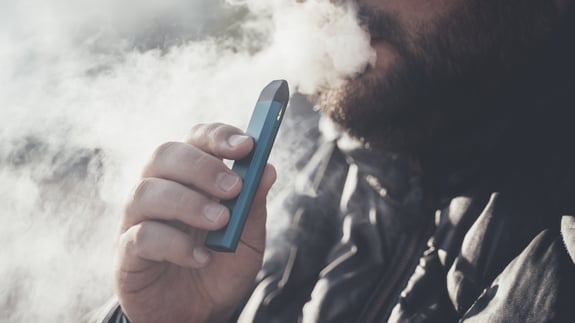Purpose
The City of [name] is dedicated to enhancing the quality of life for all residents. As part of this commitment, this policy addresses the environmental and public health impacts of tobacco use.
- Tobacco waste, including cigarette butts, pollutes parks, waterways, and green spaces, releasing harmful chemicals that contaminate soil and water, endangering local ecosystems. Additionally, exposure to secondhand and thirdhand smoke poses significant health risks. Secondhand smoke affects non-smokers, particularly children and individuals with respiratory conditions, while thirdhand smoke lingers on surfaces, continuing to expose people to toxic chemicals.
- This Parks and Recreation policy aims to create cleaner, healthier outdoor spaces by reducing these environmental and health hazards.
Definitions
- Smoke or Smoking: inhaling, exhaling, burning, operating, or carrying any Tobacco Product (lighted or heated) containing, made, or derived from nicotine, tobacco, or other plant, whether natural or synthetic, that is intended for inhalation. Smoke or Smoking also includes carrying or using an electronic smoking device.
- Tobacco Product: any product made or derived from tobacco or that contains nicotine, whether natural or synthetic, that is intended for human consumption, whether chewed, smoked, absorbed, dissolved, inhaled, snorted, sniffed, or ingested by any other means, or any component, part, or accessory of a tobacco product, including but not limited to: cigarettes; electronic smoking devices; cigars; little cigars; snuff; snus; bidis; dip; chewing tobacco; and other kinds and forms of tobacco. Tobacco Product also includes vapor products. Tobacco Product does not include traditional tobacco.
- Electronic Smoking Device: any device containing or delivering nicotine, or any other substance, whether natural or synthetic, intended for human consumption through the inhalation of aerosol or vapor from the product. Electronic smoking device includes, but is not limited to, devices manufactured, marketed, or sold as e-cigarettes, e-cigars, e-pipes, vape pens, mods, tank systems, or under any other product name or descriptor. Electronic smoking device includes any component part of a product, whether or not marketed or sold separately, including but not limited to e-liquids, e-juice, cartridges, or pods.
- Nicotine Analog Product: Any chemically engineered product designed for human use that contains compounds structurally similar to nicotine, including its derivatives or metabolites.
- Traditional Tobacco (Ċanśaśa): The cuttings or shavings of plants in their natural form including but not limited to red willow bark, sage, and sweet grass. Traditional tobacco has no additives and is used for medicinal purposes, ceremony, prayer, and social gatherings.
- Parks and Recreational Area: any public or private area open to the public for recreational purposes, whether or not any fee for admission is charged, including but not limited to, amusement parks, athletic fields, beaches, fairgrounds, gardens, golf courses, parks, plazas, skate parks, swimming pools, trails, and zoos.
- Park Staff: Any employee, volunteer, or contractor responsible for managing, maintaining, or overseeing parks and recreational areas, including enforcing park policies and ensuring a safe and clean environment for visitors.
- [Facility] Property: including, but not limited to, any aforementioned property owned, rented, or managed by [Facility].
*Definitions found in this policy closely resemble the South Dakota State Law.
Policy
Commercial tobacco use is prohibited in the [City] parks and recreational facilities. The use of traditional tobacco is not prohibited.
- This policy applies to all employees, independent contractors, and members of the general public while attending and using the parks and recreational facilities.
- The use of commercial tobacco is prohibited in these areas: [List all applicable areas including restrooms, playgrounds, picnic areas, performance areas, baseball, and other related fields, and buildings and their entrances].
Dissemination
Tobacco-free signs shall be posted in designated areas, and the community, event attendees, and staff shall be notified of this policy. To ensure adherence within resource limitations, public education efforts such as event announcements and other available communication channels shall be utilized to support the signage and ensure consistent awareness and compliance.
Enforcement
The emphasis of this policy is on voluntary compliance, encouraging patrons to respect the health and environmental goals of the tobacco-free initiative. However, all individuals at city-owned parks or recreational facilities are empowered to request that a tobacco-user immediately extinguish or dispose of their tobacco product in accordance with this policy. In cases of non-compliance, individuals may face immediate removal at the discretion of Park staff.
- Park staff, in addition to their regular duties, shall conduct routine observations of parks and recreational facilities to monitor adherence to the policy. Staff will intervene as necessary to address violations and ensure the policy is upheld. Repeated or egregious violations may result in further disciplinary actions, including extended bans from facilities, as deemed appropriate by the city.
- To enforce compliance with this policy, public officers, including police and park staff, have the discretion to impose consequences on individuals found violating the forementioned policy, which may include community service or civil fines, based on the severity and frequency of the violation.
Exceptions
- In respect for the traditional use of tobacco by American Indian people, traditional tobacco use will be the exclusive exception to this policy. A person may possess or provide traditional tobacco, related devices, or lighters to any other person as part of an Indigenous practice or a lawfully recognized religious, spiritual, or cultural ceremony or practice. Traditional tobacco use for events must be approved prior to usage by Park staff.
- Grounds for denial of traditional tobacco use at an event should be applied sparingly and only in exceptional circumstances. School administrators or the School Board should carefully evaluate the situation to ensure that such decisions are made with consideration of both the cultural significance of the event and the well-being of those involved.
- “Tobacco product” does not include any product that has been approved by the United States Food and Drug Administration for sale as a tobacco cessation product or for other therapeutic purposes where such product is marketed and sold for such a purpose.
Effective Date
The policy set forth above is effective [date] for City of [name] and was last updated [date].
Updated April 2025







